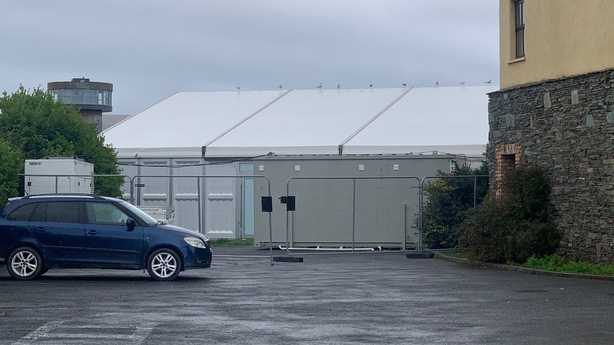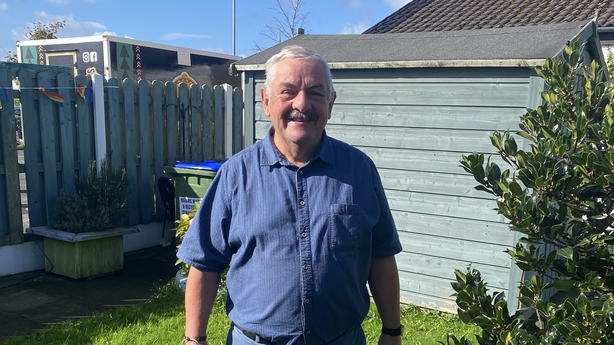'Ali' had joked with me on the phone that everyone who was currently sharing the tent on the grounds of the Johnston Marina direct provision centre would meet me.
When I arrived at the Tralee International Resource Centre, I thought he may not have been joking after all. The room was packed.
The Department of Children, Equality, Disability, Integration and Youth has given the number of people living in the tent since the 28 July as 40 - some of the men say its 39.
Either way, many of them were at the Resource Centre today.
Some spoke English, others did not. All had come to make it clear that they were growing increasingly concerned about their living conditions.
They showed me videos of the conditions in the tent last night amid the wind and the rain.
In the footage you could see the tarpaulin on the large high ceilinged marquee style tent straining in the wind.
We need your consent to load this rte-player contentWe use rte-player to manage extra content that can set cookies on your device and collect data about your activity. Please review their details and accept them to load the content.Manage Preferences
The noise of the rain beating against the tent was striking too.
"We don't get to sleep every night," Ali tells me.
"If the winds are blowing fast or strong, the whole structure starts shaking and there is lots of noise."
"There are only two electrical heaters... not enough for the size of the tent," he said, showing me one of them in one of the videos that was recorded last night.
He said that it has been raining for the last two nights, and they have to brave it to use the toilets.
"The toilets are outside in the (direct provision) building, we have to walk outside in the night just to use the toilets," he said.
The first tented facility to house refugees or asylum seekers opened in Gormanston in Co Meath, which was a family centre, originally and later predominantly for Ukranian refugees.
While the opening of the Meath camp to refugees was widely reported on, few outside of Tralee knew of the tented facility that opened on the grounds of a State-owned direct provision centre in the town just nine days later.
This facility is for single men, although it has been located on the same site as a direct provision centre that caters for families.
The style of accommodation differs from Gormanston too. While it had a series of military style tents, at the Tralee site there is only one large one, subdivided into makeshift rooms using screens.
A Department spokesperson told RTÉ News that the spec of the tents is different too.

They said that the tents in Gormanston were not deemed suitable for winter.
This week saw the last residents of the camp moved out, with the camp is being dismantled this weekend.
However, the department spokesperson said that the tents used to accommodate international protection applicants on the site in Tralee - and in two more tented camps which opened last month in Clare and Westmeath - are deemed winter-proof.
None of the men that I spoke to living in the tent in Tralee agreed.
"I think that it's not a suitable place to live in the winter in Ireland," Nick* said.
"We are about 40 men inside and we can't sleep inside there when the wind is blowing... everything is shaking inside there, there's so much noise," he said.
He said that the weather is already "so bad" and that "its so cold inside... you can't sleep inside, that's why everyone is in such a stressed situation. It's horrible, really."
Another difference between the Gormanston and Tralee camps is the length of time people stayed in each camp.
Read more: Over 300 asylum seekers remain in tented accommodation
At Gormanston, no Ukrainian refugee stayed for longer than three weeks, although international protection applicants from other countries had to spend more than five there.
However, the group staying in the Kerry camp have stayed the longest living in a tent since this style of accommodation was introduced in July, 10 weeks so far.
"We just want to know how much time we will be there and no-one has an answer about it," Nick said.
The department has said that "residents will be moved from tented accommodation when there are suitable alternative accommodation places available."
In September, it gave the "end of autumn" as a target exit date for those staying in the Johnston Marina tent, and when asked this month is there was any update to this, a spokesperson replied that "the situation remains the same".
"I think that every hour that they spend in these circumstances is just not acceptable," chairperson of the Tralee International Resource Centre Sean Lyons said.

"A group of them here now have just walked over 2km so they can sit down and have a cup of tea or a cup of coffee in peace. Some of them have not slept for nights, so every night they stay there it is adding to the stress, it is adding to the anxiety, it is adding to the trauma."
Mr Lyons also expressed concerns for those already living in the direct provision centre and the negative impact the new situation is having on them.
"The Johnston Marina is for families... and now these men have been placed there through, absolutely and obviously no fault of their own," Mr Lyons said.
Nevertheless, he added that it has "impacted on the lives of people who are already in direct provision there, they are families with young children".
"It just adds to the stress and anxiety for everyone involved," he said.
*Names have been changed for anonymity purposes







